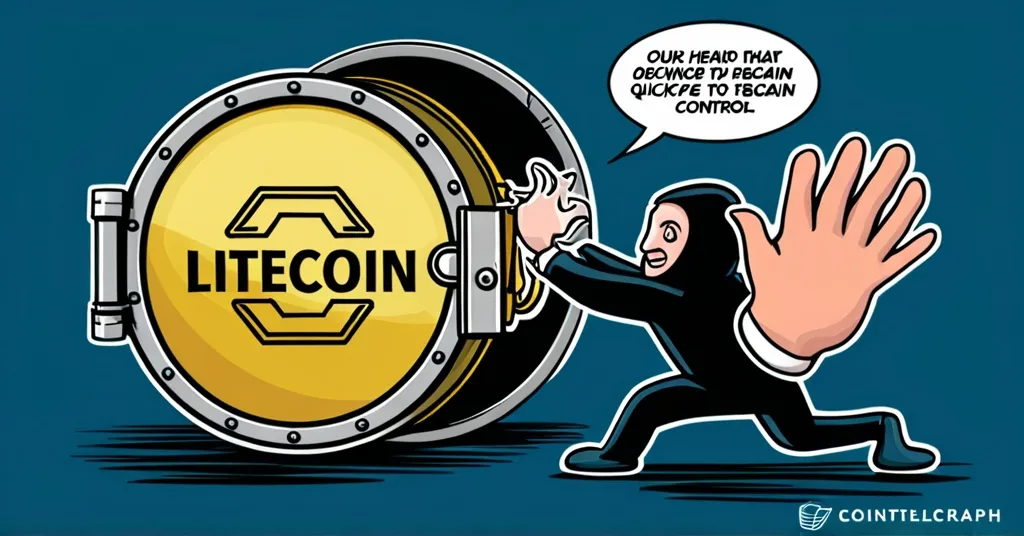Litecoin X Account Hacked: Fake Solana Token Promoted, Team Swiftly Regains Control

Litecoin’s X Account Hacked to Promote Fake Solana-Based Token, Team Regains Control
On January 11, Litecoin’s official X account was compromised to promote a fake token scam, claiming a new Litecoin token on the Solana network. The incident, part of a worrying trend of social media hacks in the crypto industry, was swiftly addressed by the Litecoin team.
- Litecoin X account hacked on January 11
- Fake Litecoin token on Solana promoted
- Team regained control; identified breach source
The Hack
The hackers used a deceptive post to push the scam, which included a contract address and a link to the pump.fun platform, tempting users to invest in what was a nonexistent token. The breach originated from a compromised delegated account—an account managed by someone else on behalf of the original owner—highlighting a vulnerability in account management practices.
Response and Recovery
The Litecoin team acted quickly to regain control of their X account. By tracing the hack back to the compromised delegated account, they were able to secure their platform and prevent further damage. Their prompt response underscores the importance of robust security measures and vigilant monitoring.
Recent Incidents
This incident is not isolated but part of a broader pattern of social media hacks targeting the crypto sector. In October, Andy Ayrey, the founder of Truth Terminal, had his X account exploited to promote the “IB” token, yielding a staggering $600 million in profit. That same month, EigenLayer’s account was used to advertise a fake airdrop campaign called “Season 2 Stakedrop.” November saw rapper Wiz Khalifa’s X account used to promote the “WIZ” memecoin, while December brought hacks on the Cardano Foundation and Animoca Brands co-founder Yat Siu’s accounts, pushing “ADAsol” and another fake memecoin on Solana, respectively.
Industry Implications
These repeated attacks highlight the urgent need for enhanced cybersecurity within the cryptocurrency industry. While we champion the ideals of decentralization and the disruptive potential of blockchain technology, we must also confront the darker aspects of our industry. Scammers exploit the allure of quick gains to deceive investors, undermining trust and threatening the very ethos of our movement toward financial freedom and privacy.
Bitcoin remains the cornerstone of our vision for a decentralized financial future, yet we recognize the unique roles that other blockchains and cryptocurrencies play. The misuse of platforms like X to spread malicious scams directly attacks our community’s integrity. It’s a stark reminder that while we advocate for effective accelerationism (e/acc) and the disruption of the status quo, we must also fiercely protect our digital spaces.
As we celebrate the transformative potential of cryptocurrencies, we must also be the first to call out scams. No tolerance for scammers, no blind following of unrealistic price predictions, and no shilling of fake tokens. Our mission is to inform, educate, and engage, ensuring our readers can navigate both the highs and lows of this volatile landscape.
Key Takeaways and Questions
- What was the purpose of the Litecoin X account hack?
To promote a fake Litecoin token on the Solana network, tricking users into investing.
- How did the Litecoin team respond to the hack?
They regained control of the account and identified the breach as coming from a compromised delegated account.
- What broader trend does this incident highlight?
It highlights the increasing trend of social media account hacks within the cryptocurrency sector to promote fake tokens and phishing scams.
- What are some other similar incidents mentioned?
Other incidents include hacks on the X accounts of Truth Terminal’s founder, EigenLayer, Wiz Khalifa, Cardano Foundation, and Animoca Brands.
- What should cryptocurrency users do to protect themselves from similar scams?
Users should be cautious of unsolicited links, verify information from official sources, use strong, unique passwords, enable two-factor authentication, and stay informed about the latest security practices.
In our quest for a decentralized future, vigilance is key. The crypto space thrives on innovation and disruption, but it’s our collective responsibility to ensure it’s not overshadowed by scammers. Let’s keep pushing forward, with our eyes wide open to both the opportunities and the pitfalls that lie ahead. Have you ever encountered a crypto scam? Stay alert and keep learning!



